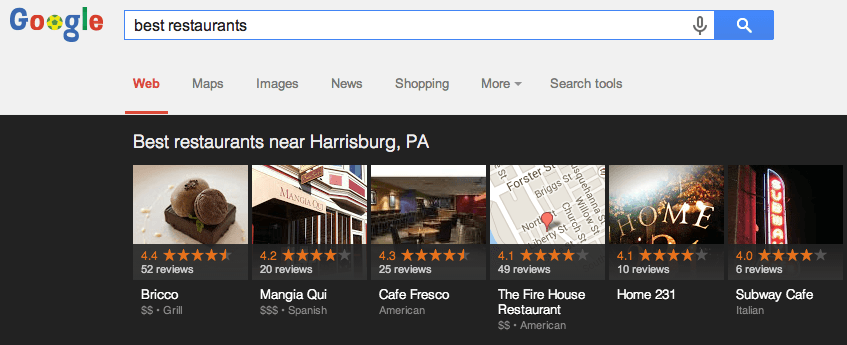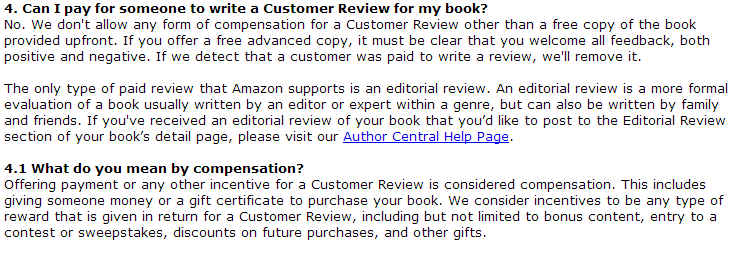-
 11 min. read
11 min. read
-
 WebFX Team
WebFX Team Digital Marketing Agency
Digital Marketing Agency
- The WebFX team is made up of more than 450 subject matter experts in digital marketing, SEO, web design and web development, social media, and more. Together, they’ve helped WebFX’s clients earn more than $3 billion in revenue from the web — and that’s just in the past five years. @webfx
A struggle for many business owners is getting their average customer to leave a positive review online. Unfortunately, people are often quick to leave a review online only if they are dissatisfied with their experience and want to seek personal justice with a punishing or negative review. In order to receive more positive reviews, businesses usually decide to offer incentives or freebies to reward customers for talking up their business online.
Popular methods of incentivizing online reviews include offering a product discount, entry into a monthly prize drawing, or even cold hard cash. At this point in the game, most business owners have felt the sting of a negative review, whether it was warranted or not, and have yearned to cover it up . Business owners are also becoming well aware of the SEO benefits of online reviews, especially for local SEO.
If you want your business to show up here:  … then you need reviews. Bribery is a strong word.
… then you need reviews. Bribery is a strong word.
But how can a business encourage patrons to leave more (positive) reviews without coming close to doing this? Is “incentivizing” a no-no for businesses? Short answer: yes.
While it’s crucial to do everything you can to bring in positive reviews on a regular basis, it’s equally important to adhere to the guidelines of each review site to keep your business out of trouble. This is why reputation management has become an integral part of managing an online presence. Incentivizing reviews has been a big grey area for many online review sites in the past, but it’s becoming increasingly dangerous to encourage reviews for many sites.
Here’s how the most popular online review websites feel about incentivizing reviews, and how you can get more reviews of your business without stepping into the gray area of incentivization.
Video: Online Review Management
Yelp
Do not mess with Yelp. Since receiving a lot of backlash about possibly favoring business accounts who pay for Yelp advertising, this online review giant is quick to “hide” reviews they feel are paid or from illegitimate users. Unfortunately, they often hide completely legitimate reviews from real people but the idea is of course to keep businesses from encouraging lots of people to create Yelp accounts for the sole purpose of leaving their business a 5 star review. Hidden reviews are accessible but only after clicking this ominous message on a Yelp business page: ![]() Businesses can get into real trouble with Yelp for encouraging reviews. What Yelp is really looking for are reviews from active Yelp users, people who have had a Yelp account for some time, who engage with other users, and have multiple reviews of various businesses already.
Businesses can get into real trouble with Yelp for encouraging reviews. What Yelp is really looking for are reviews from active Yelp users, people who have had a Yelp account for some time, who engage with other users, and have multiple reviews of various businesses already.
If you have a lot of reviews from people who never bothered to even complete their basic profile information and have no other reviews other than your business, they will likely end up being hidden or “not currently recommended” by Yelp. Yelp actually gone so far as to post these obnoxious warning messages on business accounts who have been “caught in the act”:  Here’s Yelp’s take on incentivizing reviews:
Here’s Yelp’s take on incentivizing reviews:  Basically, Yelp wants people to review your business without ever being prompted to do so (wouldn’t that be nice!). Just be a great business and you should just expect to receive lots of reviews (duh).
Basically, Yelp wants people to review your business without ever being prompted to do so (wouldn’t that be nice!). Just be a great business and you should just expect to receive lots of reviews (duh).
Google+
Google has changed it’s line on incentivizing reviews over the years.
They naturally have a lot of tools to detect what it deems to be fake reviews, and a lot of times businesses will lose legitimate reviews temporarily or even permanently for crossing Google’s guidelines. Having in store kiosks, for example, is one idea many businesses have successfully implemented to get more Google reviews. But since Google tracks the IP address of reviews, this will likely backfire over time and get you into trouble.
That being said, Google has no problem with you “encouraging” customers to leave reviews. However…  So there is a fine line with incentivizing patrons for Google+ reviews.
So there is a fine line with incentivizing patrons for Google+ reviews.
That’s not to say you can’t get away with incentivizing reviews, at least temporarily. For example, check out this local salon who looks just a tad out of place among local competitors:  That being said, the repercussions with Google are often quite serious, especially given that many people now attribute up to 85% of search traffic as coming from Google. The short term gains from incentivizing reviews are admittedly tantalizing, but keep in mind that Google can easily remove all your reviews, penalize your site, and even keep you from showing up in search results completely if you’re caught.
That being said, the repercussions with Google are often quite serious, especially given that many people now attribute up to 85% of search traffic as coming from Google. The short term gains from incentivizing reviews are admittedly tantalizing, but keep in mind that Google can easily remove all your reviews, penalize your site, and even keep you from showing up in search results completely if you’re caught.
Ouch.
There is not much to be found on incentivizing Facebook recommendations, but when it comes to developer apps on Facebook, they have this to say: 
TripAdvisor
On many sites it’s quite difficult (surprisingly) to find clarity on their incentive policy, but not TripAdvisor: 
Angie’s List
As you may know, Angie’s List is a different sort of online review site that requires users (not businesses) to pay a monthly subscription for access. Even so, they take a hard line on incentivizing online reviews as well, as this response from customer service makes abundantly clear:
We take the integrity of our List very seriously. Businesses may certainly encourage customers to join and review on their service experiences.
However, businesses may not purchase memberships for their clients or offer reimbursements for buying a membership. We appreciate you wanting to share the List, but our goal is to avoid any hint of quid pro quo. When we find out that a company has done this, reviews from these members are removed.
Amazon
Amazon is also quite particular about incentivizing or compensating customers for reviews, despite having its own system for incentivizing reviews of particular products (Amazon Vine).
Here’s their official stance on incentives:  It’s also worth mentioning that reposting reviews from one review site to another or even asking patrons to leave the same review in multiple places is a bad idea. As we all know, search engines are not keen on duplicate content, and most online review sites follow suit. While it may take some sites a long time to figure out your review is a duplicate, Google+, is aggressively remove reviews once they are found elsewhere.
It’s also worth mentioning that reposting reviews from one review site to another or even asking patrons to leave the same review in multiple places is a bad idea. As we all know, search engines are not keen on duplicate content, and most online review sites follow suit. While it may take some sites a long time to figure out your review is a duplicate, Google+, is aggressively remove reviews once they are found elsewhere.
These are just a few of the more popular online reviewing sites out there, but by now you get the idea. At best, an online review site may allow you to “encourage” your customers to leave reviews of your business, but incentivizing is most definitely a no-no. You may achieve short term gains by offering freebies in exchange for client reviews, but in the long run you’re sure to pay more than you bargained for if you’re found out.
Threatening Customers Who Post Negative Reviews is a Bad Idea, Too
In August 2014, the Union Street Guest House, a hotel in Hudson, NY, was reported by the NY Post’s Page Six to be fining guests who post negative reviews of its establishment online.
Since the majority of the hotel’s guests are bridal parties, the hotel’s fines were reportedly $500 per review. Below is a piece of the original policy as it appeared on the Union Street Guest House’s website prior to August 4th:
Please know that despite the fact that wedding couples love Hudson and our Inn, your friends and families may not. […] If your guests are looking for a Marriott type hotel they may not like it here. Therefore: If you have booked the Inn for a wedding or other type of event anywhere in the region and given us a deposit of any kind for guests to stay at USGH there will be a $500 fine that will be deducted from your deposit for every negative review of USGH placed on any internet site by anyone in your party and/or attending your wedding or event If you stay here to attend a wedding anywhere in the area and leave us a negative review on any internet site you agree to a $500. fine for each negative review. (Please NOTE we will not charge this fee &/or will refund this fee once the review is taken down).
Basically: if your wedding party members leave a negative review, you’ll be out $500. If they take it down, you’ll get your $500 back. As expected, once Page Six broke this story, a number of other news websites picked it up as well, including TIME, Fox News, CNET, and so on. The hotel’s Yelp page was immediately flooded with one star reviews (warning: explicit language).
The hotel’s Facebook page has also received similar treatment (similar warning for language in reviews).  A hotel representative responded, claiming that it was a “tongue-in-cheek response to a wedding many years ago” and “certainly never enforced,” but the damage has likely already been done. So while paying customers to review your business is bad, threatening them if they leave a bad review can be even worse.
A hotel representative responded, claiming that it was a “tongue-in-cheek response to a wedding many years ago” and “certainly never enforced,” but the damage has likely already been done. So while paying customers to review your business is bad, threatening them if they leave a bad review can be even worse.
Don’t make the same mistake this hotel did.
Increasing Your Reviews (And Staying Out of Trouble)
So how can a business bring in positive reviews without offering incentives? Here are a few ideas:
- Display logos of popular review websites in the front window of your business, in your waiting room, on your menus, at the bottom of receipts, and on materials your patrons might take home after visiting your business.
- Add links to your business profiles on popular review sites to your email signature, website header/footer, and on your social media pages.
- Send a follow up email to your customers thanking them for their business and asking about any concerns they might have. Conveniently include logos linking to your business profile on popular review sites.
- Talk to your customers about how much you value online reviews during their visit.
- Appeal to the ego of your customers by highlighting actual reviews on your website, via social media shoutouts, or by printing them out and hanging them in your place of business.
- Respond to online reviews (even the bad ones) on sites like Yelp and TripAdvisor to show people you take their feedback seriously.
There are lots of other resources out there about how to get more online reviews for your business, but this list should get you started in the right direction. If you have other ideas for getting new reviews that have worked for you we’d love to hear about them in the comment section below. If you’re interested in how WebFX reviews are managed with our proprietary ReviewFX software, contact us today!
Just remember, it doesn’t pay to pay for online reviews! Photo Credit: StockMonkeys.com
-
 The WebFX team is made up of more than 450 subject matter experts in digital marketing, SEO, web design and web development, social media, and more. Together, they’ve helped WebFX’s clients earn more than $3 billion in revenue from the web — and that’s just in the past five years.@webfx
The WebFX team is made up of more than 450 subject matter experts in digital marketing, SEO, web design and web development, social media, and more. Together, they’ve helped WebFX’s clients earn more than $3 billion in revenue from the web — and that’s just in the past five years.@webfx -

WebFX is a full-service marketing agency with 1,100+ client reviews and a 4.9-star rating on Clutch! Find out how our expert team and revenue-accelerating tech can drive results for you! Learn more
Try our free Marketing Calculator
Craft a tailored online marketing strategy! Utilize our free Internet marketing calculator for a custom plan based on your location, reach, timeframe, and budget.
Plan Your Marketing Budget

Maximize Your Marketing ROI
Claim your free eBook packed with proven strategies to boost your marketing efforts.
Get the GuideTry our free Marketing Calculator
Craft a tailored online marketing strategy! Utilize our free Internet marketing calculator for a custom plan based on your location, reach, timeframe, and budget.
Plan Your Marketing Budget





